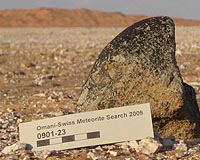 |
London, UK (SPX) Jun 02, 2009 Large bombardments of meteorites approximately four billion years ago could have helped to make the early Earth and Mars more habitable for life by modifying their atmospheres, suggests the results of a paper published in the journal Geochimica et Cosmochima Acta. When a meteorite enters a planet's atmosphere, extreme heat causes some of the minerals and organic matter on its outer crust to be released as water and carbon dioxide before it breaks up and hits the ground. Researchers suggest the delivery of this water could have made Earth's and Mars' atmospheres wetter. The release of the greenhouse gas carbon dioxide could have trapped more energy from sunlight to make Earth and Mars warm enough to sustain liquid oceans. In the new study, researchers from Imperial College London analysed the remaining mineral and organic content of fifteen fragments of ancient meteorites that had crashed around the world to see how much water vapour and carbon dioxide they would release when subjected to very high temperatures like those that they would experience upon entering the Earth's atmosphere. The researchers used a new technique called pyrolysis-FTIR, which uses electricity to rapidly heat the fragments at a rate of 20,000 degrees Celsius per second, and they then measured the gases released. They found that on average, each meteorite was capable of releasing up to 12 percent of its mass as water vapour and 6 percent of its mass as carbon dioxide when entering an atmosphere. They concluded that contributions from individual meteorites were small and were unlikely to have a significant impact on the atmospheres of planets on their own. The researchers then analysed data from an ancient meteorite shower called the Late Heavy Bombardment (LHB), which occurred 4 billion years ago, where millions of rocks crashed to Earth and Mars over a period of 20 million years. Using published models of meteoritic impact rates during the LHB, the researchers calculated that 10 billion tonnes of carbon dioxide and 10 billion tonnes of water vapour could have been delivered to the atmospheres of Earth and Mars each year. This suggests that the LHB could have delivered enough carbon dioxide and water vapour to turn the atmospheres of the two planets into warmer and wetter environments that were more habitable for life, say the researchers. Professor Mark Sephton, from Imperial's Department of Earth Science and Engineering believes the study provides important clues about Earth's ancient past: "For a long time, scientists have been trying to understand why Earth is so water rich compared to other planets in our solar system. The LHB may provide a clue. This may have been a pivotal moment in our early history where Earth's gaseous envelope finally had enough of the right ingredients to nurture life on our planet." Lead- author of the study, Dr Richard Court from Imperial's Department of Earth Science and Engineering, adds: "Because of their chemistry, ancient meteorites have been suggested as a way of furnishing the early Earth with its liquid water. Now we have data that reveals just how much water and carbon dioxide was directly injected into the atmosphere by meteorites. These gases could have got to work immediately, boosting the water cycle and warming the planet." However, researchers say Mars' good fortune did not last. Unlike Earth, Mars doesn't have a magnetic field to act as a protective shield from the Sun's solar wind. As a consequence, Mars was stripped of most of its atmosphere. A reduction in volcanic activity also cooled the planet. This caused its liquid oceans to retreat to the poles where they became ice. Share This Article With Planet Earth
Related Links Imperial College London Asteroid and Comet Impact Danger To Earth - News and Science
 Searching For Meteorites In The Deserts Of Oman
Searching For Meteorites In The Deserts Of OmanMoffett Field CA (SPX) May 20, 2009 Meteorites provide valuable information about the early history of the solar system. A group of Swiss geologists have conducted systematic meteorite searches in Oman since 2001, and they recently returned from their latest hunt. Most meteorites are fragments of asteroids, some of which contain organic matter. Some meteorites preserve information on the chemical make-up of the solar system ... read more |
|
| The content herein, unless otherwise known to be public domain, are Copyright 1995-2009 - SpaceDaily. AFP and UPI Wire Stories are copyright Agence France-Presse and United Press International. ESA Portal Reports are copyright European Space Agency. All NASA sourced material is public domain. Additional copyrights may apply in whole or part to other bona fide parties. Advertising does not imply endorsement,agreement or approval of any opinions, statements or information provided by SpaceDaily on any Web page published or hosted by SpaceDaily. Privacy Statement |